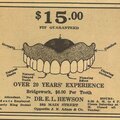
Buffalo Express photo of the damage from the July 14, 1898 explosion. Image source: private collection.
to work. Two of the men employed at the Starch Works undoubtedly considered themselves fortunate to live close by on Howard Street.
Suddenly, one of the boilers exploded. As the Express described the result: "The Three floors of the milling department of the factory, which really made up Building A, had sunk to the level of the floor of the second floor. The roof was still attached to the edge of the building of Building B and it sloped from this roof to the center of the ruin of Building A. Two monstrous vats, which had held some sort of chemical used in the manufacture of starch, had tipped out of the second floor and sagged to the sidewalk on Oneida Street."
Four employees were killed, all in the boiler house, including the teamster. But greater carnage occurred in the neighborhood which absorbed the force of the blast. Two babies and the mother of one were killed by falling debris. Another 25 were listed as injured, 11 of them children under 16 years of age.
The cause of the explosion could not be determined because both the fireman and engineer on duty in the boiler house were killed. No part of the boiler remained at the scene of the explosion, but stories abounded about the destination of large iron pieces of it. George Suhr, owner of a grocery store at the corner of Howard and Emslie Streets, had a 2.5 foot long piece weighing 107 pounds tear through his front awning and wedge into the wooden sidewalk five feet from his employee. His store was 500 yards from the factory.
Blocks of storefronts and houses nearest the blast zone were bombarded by bricks, which caused most of the injuries. The Express reporter said that "Howard Street looked like a brick factory and a glass factory after a huge rolling machine had passed through them. The street was literally covered with broken glass and broken brick."
And people reacted to the event in their myriad human ways. "Mrs. Merkle and her daughter, Mrs. Louis Merkle, were sitting in the yard of their home at 38 Oneida Street and were thrown to the ground. Both ran into the house and locked the doors."

1900 Map showing the block largely occupied by the Niagara Starch Works, bounded by Lord, Oneida, Bond and Howard Street.
The Niagara Starch Works was owned by German immigrants J. Adam Lautz and his brother Charles, both of whom emigrated from Dieburg, Germany as children in 1853. They were well-known and respected Buffalo businessmen; their firm, Lautz Brothers & Co., invested in the Niagara Starch Works and the Niagara Stamping & Tool Works, among other ventures. J.Adam Lautz was a director of the Citizens Bank, co-founder of Orpheus and president of Ziegele Brewing. Brother Charles Lautz made his name in the soap manufacturing business and was president of the Niagara Heights Land Company in addition to his interest in the Starch Works and Tool Works companies.













